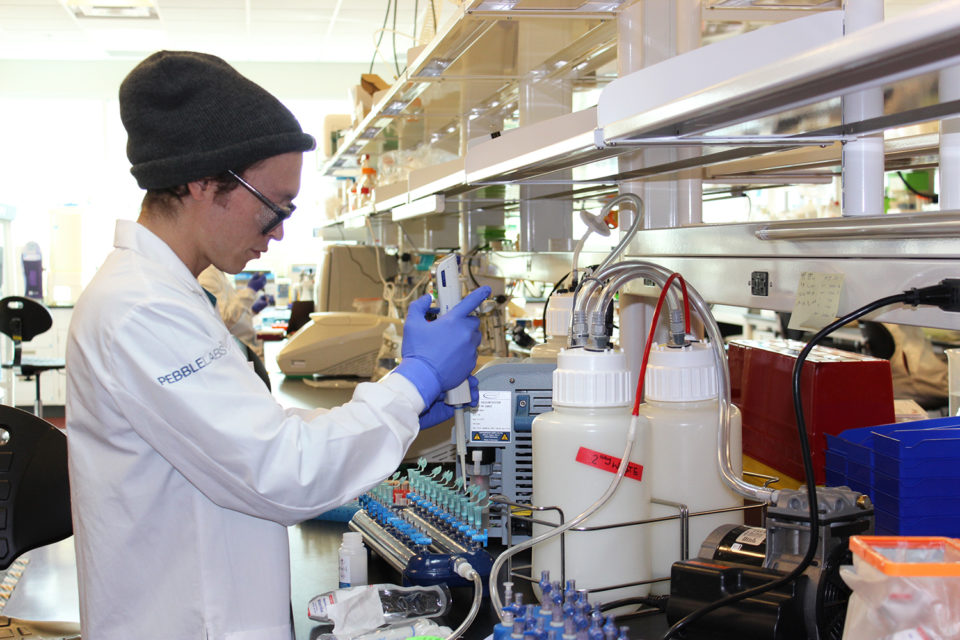Deploying RNAi technology, biotech firm Pebble Labs takes on shrimp industry’s archrival diseases WSSV, EMS

The global shrimp-farming sector is one of aquaculture’s great success stories, despite its ongoing battles with viral aquatic diseases that can render once-thriving ponds empty and wasted.
One of the most devasting shrimp diseases worldwide over the past few decades has been White Spot Syndrome Virus (WSSV), a dsDNA viral infection that plagues penaeid shrimp like the widely produced Pacific white shrimp (Penaeus vannamei) and can kill off entire populations in a very short period of time. The contagious disease is caused by a collection of related viruses that all create similar symptoms. Many of the losses – some $1 billion a year – have piled up on smallholder farmers throughout Asia and Central and South America.
Solutions to WSSV are scarce – once a pond is infected, farmers have little choice but to conduct an emergency harvest before the virus runs its course. A biotechnology company based in New Mexico is working to address this problem, starting not with virus control but rather by harnessing natural bacteria within the shrimp itself to block the transmission of the disease – a process known as RNA interference, or RNAi.
“We’re using a technology where we have the ability to modify and provide RNAi, which is the messenger that interacts with DNA, directly to plants and animals,” explained David Morgan, president of Pebble Labs, which is applying much of the same science that researchers are using to address human diseases. “We use it to affect the development of pathogens in particular in species, and we get the RNAi into the plant or animal by way of bacteria.”
It’s a little like using probiotics to improve bacterial flora. But rather than eating yogurt to regulate gut health, Pebble Labs is using bacteria to express RNAi in the plants and animals that live alongside that bacteria, effectively turning on their own natural defenses against diseases, viruses, fungi and even some pests.
“Using this platform technique, which we call Directed Biotics, we’re using naturally occurring bacteria which are already present in the shrimp population,” Morgan said. “We modify those bacteria, they deploy the RNAi into the shrimp and that RNAi will effectively knock out some of the more serious diseases that are affecting shrimp.”
https://www.aquaculturealliance.org/advocate/wssv-infection-and-molt-stage/
Characteristically, WSSV causes small white spots to appear on the shrimp’s body, indicative of calcium salts that are building up under the shell. Over time, these deposits can damage the shrimp’s gills and other internal organs, eventually leading to death. As shrimp farming has expanded in tropical parts of Southeast Asia in recent years, WSSV cases have grown right alongside it, thriving as it does in warm climates.
Pebble Lab’s MermaidBio line is designed to address prevention of WSSV and other diseases without the use of antibiotics. It promises a natural solution that fights common diseases while protecting the “purity, quality and safety of seafood products and their ecosystem,” increasing production and creating a more sustainable seafood supply chain. Right now, different application techniques are being tested, but the expectation is that the RNAi solution can be incorporated into fish feed, minimizing the work that farmers will need to do to introduce the product into their facilities.

And, yes, the company believes that its Directed Biotics platform could one day replace antibiotics in fish farming entirely. The potential applications for this type of technology are broad, and Pebble Labs is working on new solutions for agriculture as well, but the company’s initial aquaculture focus is on preventing WSSV as well as Early Mortality Syndrome (EMS) in shrimp.
Like white spot syndrome, EMS is effectively 100 percent lethal once contracted and has had a presence in Vietnam, Malaysia and Thailand since at least 2009. In testing, Pebble Labs says its RNAi technique has been able to depress the infection rate of EMS by about 60 percent, compared to existing treatments that have never been able to crack 10 percent containment. It’s not complete control but represents a substantial improvement that Morgan hopes will have a material impact on the shrimp market.
“So, here are two very large challenges in shrimp production that we have a technology solution for,” he said, “and that is attracting quite a bit of attention. So much so that we’re in the last stages of concluding an agreement with one of the largest animal health companies in the world involved to be a commercial partner in their aquaculture program.”
Pebble Labs is already getting out of the lab and into ponds this year, testing out its platform on a wide variety of environmental production regimes. Once that’s done, the company expects to get a product on the market in 2021.
Follow the Advocate on Twitter @GAA_Advocate
Now that you've finished reading the article ...
… we hope you’ll consider supporting our mission to document the evolution of the global aquaculture industry and share our vast network of contributors’ expansive knowledge every week.
By becoming a Global Seafood Alliance member, you’re ensuring that all of the pre-competitive work we do through member benefits, resources and events can continue. Individual membership costs just $50 a year. GSA individual and corporate members receive complimentary access to a series of GOAL virtual events beginning in April. Join now.
Not a GSA member? Join us.
Author
-

Tim Sprinkle
Tim Sprinkle is a writer based in Denver, Colo. His work has appeared in Wired, Outside and many other publications, and he is the author of the 2015 book, “Screw the Valley: A Coast-to-Coast Tour of America’s New Tech Startup Culture.”
Related Posts

Responsibility
Phage therapy provides targeted bacteria treatment
The use of phages is an alternative to antibiotics in the control of pathogenic bacteria. Phage therapy offers low-cost, low-toxicity treatment and quick bactericidal effects.

Innovation & Investment
Scottish firm honing bacteriophages into aquaculture-disease assassins
Scottish biotech firm Fixed Phage aims to bottle the powers of bacteriophages to deploy these “bacteria killers” on some of the world’s most destructive aquaculture diseases.

Health & Welfare
The myth of the static microbiome
In these early stages of understanding how microbiome changes impact animal health, use caution in interpreting lab results and how they may apply to the real world.

Health & Welfare
Probiotics and disease control in aquaculture
The use of probiotics in aquaculture is steadily gaining momentum, supplementing or replacing the use of antimicrobial compounds in disease control.

